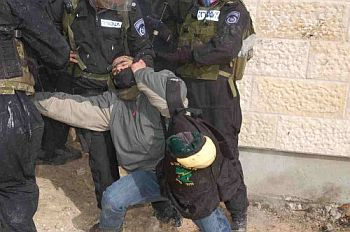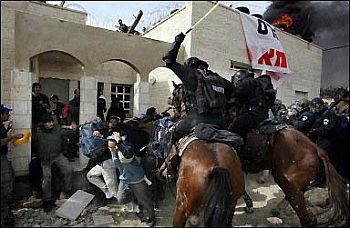The Demonization of the Fringe


Excerpts;
In his book Perfidy, while retelling the story of the trial of Dr. Rudolf Kastner in 1955, Ben Hecht records the testimony of Joel Brand, who was tasked with saving literally millions of Hungarian Jews from the ovens of the Holocaust. Amongst the tragedies that this testimony reveals is the devastating effect that can result from the marginalization of upright individuals who do not submit to foul policies of the establishment.
The calamity at Amona could only have been carried out after the general public in Eretz Yisroel and in America had been convinced, to the point of being brainwashed, of the unlawfulness of the “extreme-right-fanatical-fringe-element”, known as “settlers”.
In Perfidy, the establishment being discussed is the Jewish Agency of that time. Hecht explains that the British government founded the Jewish Agency and he refers to them as a “Jewish front for British policy in Palestine.”
Brand’s story takes place in 1944. He has been given a proposal to save millions of Jews and must garner international support. Brand turns to the Jewish Agency. The Jewish Agency insists he travel to Aleppo, but Brand knows this is British soil and he risks arrest.
The right-wing is in the position of being the “Jew of the Jews”. When Jews attempt to deny their true identity and present themselves as cosmopolitan, moderate, even-handed and open-minded, they are eventually mistreated. When a Jew stands proud, he is respected.
Mordechai HaYehudi (the Jew) – the “right-wing-extreme-fanatical-fringe-element” of his time – would not bow down to Haman. When Mordechai is first introduced in the story of Purim, he is referred to as “ish yemini”. Although this is generally translated as “a man from the tribe of Benjamin,” the literal meaning is “man of the right”. The commentary Tiferes Shlomo explains that to mean that Mordechai never swerved to the left.
The process of unraveling the demonization of settlers and their supporters is slow. But it should be pursued. Silence is a stamp of approval. I will turn to Perfidy again for a suitable quote to make my point: “It is always a losing battle, this trying to out-shout the authority. Those who have been in one are left with the conviction that it is easier to waken the dead than the living. But what a hopeless world it would be without this record of lost battles.”
Letters to the media and faxes to authorities, rallies and meetings may not change anything overnight, but they can erase the stamp of approval placed by silence. When Jewish blood becomes cheap, silence is not an option.


